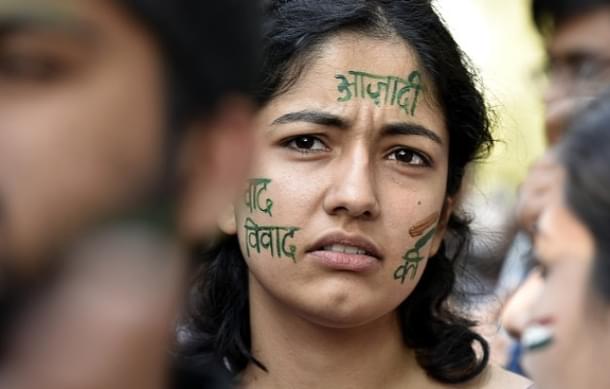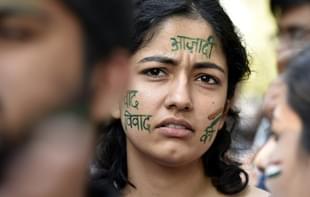Ideas
Where Are The Left’s Intellectuals?
Jaideep A Prabhu
Nov 09, 2017, 09:26 AM | Updated 09:26 AM IST
Save & read from anywhere!
Bookmark stories for easy access on any device or the Swarajya app.


Where are the right’s intellectuals? Ramachandra Guha mused approximately two and a half years ago. Whether or not the scope of the question could be expanded internationally, its focus was, at least for the moment, on India. More particularly, for heuristic purposes at least, the attention rested on the fields of history, political science, and economics, which, presumably, Guha is more familiar with than others. A few months later, Aakar Patel further narrowed the scope to Hindutva intellectuals.
Both Guha and Patel had stirred up the proverbial hornet’s nest and received a flurry of rebuttals that questioned the methodological and definitional parameters of their articles. However, despite the authors’ assertions to the contrary, the same question could be flipped back on to the left – where are the left’s intellectuals? As someone who had until recently considered himself solidly as a man of the left, the lack of a satisfactory answer to this question bothered me.
What were the great ideas of today’s left luminaries? Who were these leading lights? As several prominent thinkers such as Michael Walzer, Stephen Pinker, and Camille Paglia – by no means of the right themselves – have bemoaned, the contemporary left has come completely unhinged. In their lurch towards incoherent extremism, they have lost sight of their mission and are bleeding political relevance. In fact, opposition to the contemporary left has not only fuelled their opponents’ numbers, it has also polarised politics and society like never before.
Trigger warnings, safe spaces, and gender pronouns have not yet made their appearance in India – thank the gods! – and it would be more fruitful to restrict this discussion to India rather than take on the ills of the world. The Indian left has never had the distinguished lineage that their counterparts in the West could boast of. Regardless of whether one agreed with Theodor Adorno, Daniel Bell, Jürgen Habermas, Edward Thompson, C Wright Mills, Stuart Hall, Herbert Marcuse, Perry Anderson, or their colleagues, they presented thought-provoking critiques of society and many translated their thoughts and beliefs into activism.
Indian leftists, on the other hand, have never existed in that intellectual realm. Several of the eminent leaders such as Shripad Dange, E M S Namboodiripad, and Charu Mazumdar were at best little more than reactionary puppets of Moscow and Beijing. The rare exception, Manabendra Nath Roy, published his anarchist dystopia, New Humanism – A Manifesto in 1947, which criticised both traditional Marxism and parliamentary democracy as unsuitable for Indian conditions. Ironically, the case for an Indian ‘anderweg’ is one of the fundamental positions of Indian traditionalists who would be further thrilled to see Roy borrow from the Charvaka school of dharmic philosophy rather than lean on Karl Marx, Thomas Hobbes, or John Mill to argue against uncritically imported Western politics.
Leftists may perhaps be horrified by my casual dismissal of their stalwarts such as Irfan Habib, Nivedita Menon, and D D Kosambi, among others. Admittedly, there is something of a definitional grey zone in the matter, and as the United States Supreme Court Justice Potter Stewart said of pornography, we know an intellectual when we see his work. The primary criterion for the label, however, should be relevant application of deep knowledge to societal issues, be it via history, philosophy, literature, or some other field. A second yet equally important quality must be the influence of a work or idea beyond its immediate sphere. C Wright Mills’ The Sociological Imagination, for instance, although a work of sociology, has gone on to affect history, philosophy, literature, psychology, and several other fields. It is telling that such works have become part of the canon for scholars on the left as well as the right and cannot simply be ignored. In this regard, the Indian left’s pantheon falls short even if there may be the occasional impressive monograph with a circumscribed focus.
In the West, the degradation of the left has reduced its contemporary members to screeching banshees who have little intellectual rigour and are lost in a relativist quagmire, that, in its defence, started with the right idea in mind. With increasing success in achieving its social goals, the leftist mission took on a self-preservatory corporatist hue as those aims were extended further to avoid the loss of an agenda or political relevance. A genuine concern for non-Caucasians devolved into shrill political correctness; true distress at the second-class-citizen status of women has unravelled into a toxic movement of hatred and a search for things to be offended by; and the protection of children has degenerated into a defence of laissez-faire parenting.
Not all these issues exist with equal vehemence in India and it would be silly to expect a mirroring of Detroit, Manchester, and Marseille in Delhi, Patna, and Lucknow. Yet curiously, the Indian left has abandoned even the traditional championing of the working class, a weak concept in India as it is. Labour unions and their intellectual backers in the country have succeeded only at being disruptive forces but have done little to actually improve the quality of workers’ lives – job training, career advancement, health, and other indices remain depressing in Indian factories despite jarring sloganeering by activists, politicians, journalists, and obscure, derivative academics who have all been promoted to ersatz intellectuals of the first order, owing to the lack of genuine cerebral heavyweights.
Today, the left seems to have primarily two causes on their agenda – an uncritical, knee-jerk antipathy against the Hindu cultural sphere and fawning sycophancy towards the Nehru-Gandhi dynasty. While the latter is merely the opportunistic pursuit of sinecures, the former reveals the difference between theory and praxis. In doing so, it opens the left to a charge of either monumental hypocrisy or an insufficiently examined intellectual foundation to their politics. For example, it is unfathomable from a material or moral perspective that the left would not constantly challenge the caste system. Yet we see that the left harps on about caste as long as it remains within the Hindu fold but falls suspiciously silent when the social category carries its potence into other faiths in case of conversion.
Similarly, Hindu festivals, beliefs, and laws are subject to attack on all grounds from environmentalism to social justice, but nary a whisper is uttered against the performances, superstitions, and autocracy of other belief systems. From the materialist lineage of the left, this is a glaring and surprising omission in that not only are certain faiths given a special dispensation, but the economic worldview is held in abeyance. Worse, criticism of this double standard is not countered with logic and data but instead stifled or labelled as bigotry and marked for disregard. In fact, it has been a frequent complaint that the left typically shuts down all avenues of right expression when its holy cow – identity – is threatened. Without a cogent argument and counter-argument, debate does not move forward; as a philosophy professor of mine hammered into the skulls of his students on the first day of class, repeating your hypothesis is not making an argument.
Politicians and activists are naturally given to hyperbole and without the presence of intellectuals to present sober perspectives, the public sphere becomes a forum for exaggerations and inaccuracies; the quality of public debate deteriorates and, over time, the population becomes polarised or apathetic. Given the seven-decades-long hold of such a rent-seeking left on intellectual life in India, it is little wonder that there are few publications to boast of, the education system is a wreck, and the general well-being of the ‘proletariat’ has barely inched upwards.
The importance of high-quality intellectual framing of India’s challenges and proposed solutions cannot be understated. Leaders, as they say, are limited by their vision more than by their abilities. The Indian left’s “intellectuals” have been absconding from the policy field and its activists have instead chosen to disrupt with canned, pre-digested sound bites and shrill garble from institutional pulpits. Yet, no healthy national course can be charted by one side alone, and the absence of rigorous leftist thought weakens the right as well – no narrative can thrive in isolation. As Austrian author Ernst Ferstl wrote, it is precisely because we are all in the same boat that we should be glad that not everyone is standing on our side.
Jaideep A. Prabhu is a specialist in foreign and nuclear policy; he also pokes his nose in energy and defence related matters.





